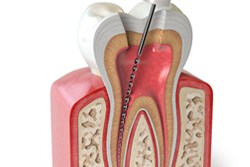Root Canal Treatment – Syracuse, NY
Rescuing Teeth, Relieving Dental Pain

Do you cringe when you hear the words, “root canal”? The Creative Dental Concepts of CNY team has great news if you need root canal treatment: advances in anesthesia and procedural techniques have virtually eliminated the pain formerly associated with root canal treatment. Saving your natural teeth is of primary importance to us. Dr. Craybas does root canal treatments in-office for most cases. However, we will consult with a trusted endodontist—a dentist who has specialized in treatment for the inner parts of teeth—as necessary to ensure patients receive the safest, most effective treatments.
Contact our Syracuse dentistry team right away if you experience any of the common warning signs that you may need root canal treatment. We’ll do our utmost to see you on the same day you call to relieve pain and start your dental restoration plan right away.
Why Choose Creative Dental Concepts of CNY for Root Canal Treatment?
- Same-Day Emergency Appointments Available
- Conveniently Located in the Hill Medical Center
- Genuinely Compassionate Dental Team
Do I Need Root Canal Treatment?

Root canals are necessary when tooth damage or decay reaches the very inner layer of the tooth called the pulp. The entire nerve structure of the tooth is housed inside this pulp layer, so when it is directly accessed by decay or damage, the result is the tooth sensitivity or pain that typically proceed the need for root canal treatment. The only way to know for sure that you need a root canal is to consult with our team, but you should let your dentistry team know right away if you experience any of the following oral health issues:
- Severe toothache that may worsen when biting down.
- Lingering sensitivity when the tooth is exposed to hot or cold temperatures.
- Infection or inflammation in the gum tissue around the tooth.
- Dark coloring in the tooth enamel typically near the gum line.
Keep in mind that although pain is common, it is not a required symptom. In other words, you may still require root canal treatment even if you aren’t in pain.
The Root Canal Process

Root canal treatment will typically require two or more treatment visits. We will always do something to relieve your pain expeditiously, and we’ll begin by numbing the area around the tooth. Then, a small access hole is made in the top of the tooth to the pulp layer. The pulp, nerve, and damaged tooth structures are all extracted through the access hole. Then, the interior part of the tooth is carefully decontaminated. In some cases, we’ll need to administer topical or oral antibiotics before we complete the treatment to ensure success. Otherwise, we’ll refill the tooth with a biologically compatible substance. Then, the access hole will be sealed off. In most cases, we will also need to place a dental crown to protect and strengthen the root canal treated tooth, which involves another appointment to complete.
The Benefits of Getting a Root Canal

Although prevention is the best option for any patient in most cases, once you’ve reached the stage where a root canal is necessary, the only other treatment option is tooth extraction. We will always do our utmost to help you avoid unnecessary tooth loss because preserving the natural tooth is almost always better than having to replace it. Contrary to commonly believed myths, root canal treatment relieves, not causes, pain, which means you should feel better after treatment. In fact, the procedure should feel just like getting a filling!
Root Canal FAQ

If you’ve been recommended a root canal, you probably have questions about the procedure. At Creative Dental Concepts of CNY, we want all of our patients to have the information they need to feel confident in their treatments. That’s why we’ve included the answers to some of the most frequently asked questions about root canal therapy. Keep reading to learn more about this smile saving treatment and why it’s so important!
Should I Be Afraid of Root Canals?
Root canals often get a bad reputation, however there is nothing to be worried about. Dr. Craybas understands that dental anxiety is a real problem, which is why he ensures that all of his patients are numb and comfortable before beginning. He also offers sedation options for a greater sense of relaxation. In most cases, patients will only experience a very slight amount of discomfort in the form of soreness. Our friendly and welcoming office will ensure that you feel comfortable from the moment you walk in!
Is Root Canal Therapy Painful?
While root canals are probably not on top of your list of fun things to do, it is very rare that this treatment will cause pain. We will use local anesthetic to numb the area. In fact, root canals are designed to get patients out of pain rather than put them in it, so you will typically feel better after your appointment than when you walked in! Usually, the only slight discomfort you may feel is some tenderness that can occur during the short recovery process. This can be managed by using over the counter pain medication like ibuprofen.
Why Are Root Canals Important?
We offer root canal therapy because it is a vital part of keeping your smile healthy. Before root canals, the only way to deal with an infected tooth was to extract it. However, root canal therapy allows us to remove decayed or infected tissue without having to remove the entire tooth. This keeps your natural smile healthy and preserved, plus it allows us to practice more conservative dentistry. We always do everything we can before having to extract a tooth.
Is There Any Aftercare or Maintenance for Root Canals?
Once your root canal in Syracuse is complete, there is a good chance that we will restore your tooth with a crown, but this will depend on a case by case basis. Be sure to avoid hard, crunchy, or sticky foods after your root canal, and take it easy on your brushing. Brushing over aggressively can harm the affected area. You should try to be gentle by chewing on the other side of your mouth and schedule your next appointment for a crown as soon as possible to avoid unnecessary sensitivity. Each day, your tooth should feel better. However, if it doesn’t, contact our office right away for follow up treatment!
